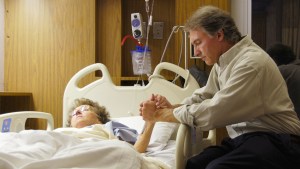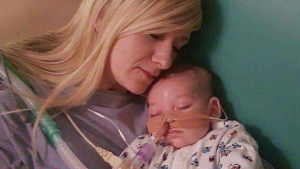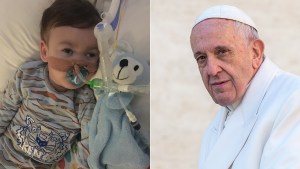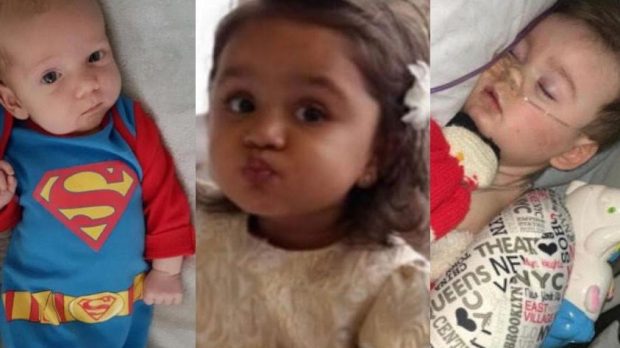A London hospital has declared that it is in the “best interests” of five-year-old Tafida Raqeeb to be allowed to die, and is refusing to let her leave despite her parents’ wish to take her to Genoa, Italy, where a children’s hospital has offered to continue treating her.
In a similar fashion to the Alfie Evans case of last year, her parents have now launched a legal challenge before the High Court.
Tafida is currently in a coma, due to a traumatic brain injury she suffered in February caused by malformed blood vessels – a condition called arteriovenous malformation (AVM). Her doctors say that “further invasive medical treatment is futile” and are planning a withdrawal of life-sustaining treatment in favor of palliative care.

Read more:
Does the Church expect us to suffer instead of “dying with dignity”?
Aleteia speaks to Michael Wee, a researcher at the Anscombe Bioethics Centre in Oxford, which is the UK’s national Catholic bioethics center, to understand the issues surrounding this case.
What would Catholic teaching say about the withdrawal of treatment in such cases?
Wee: From a Catholic perspective, there are indeed times when it would be morally permissible to withdraw life-sustaining treatment: for example because it is futile, or excessively burdensome, or its burdens outweigh its benefits to the patient. But note that what is being evaluated here is strictly the worthwhileness of treatment and never the worth of the life.
In the Charlie Gard and Alfie Evans cases, however, we saw that the High Court decisions were motivated in part by the suggestion that Charlie’s and Alfie’s lives were no longer worth living. This is the kind of judgment that nobody has the right to make. It is a dangerous way of thinking, especially for those who are disabled.
There is also often some confusion about the meaning of “futile.” Some see treatment as futile if it merely sustains life but does not cure the underlying disease. But life is intrinsically good and worthwhile, so sustaining life is never truly futile – although the benefits of treatment will be reduced if the patient can never recover, and may be outweighed by the burdens caused by treatment such as pain or even financial costs.
We do not yet know the full details of Tafida’s medical condition, which is very different from that of Charlie and Alfie, but the principle remains the same that her life is intrinsically worthwhile.
Due respect must also be given to her parents’ wishes, who ought to be treated as the primary decision-makers. From the little we know, their request to take her overseas for further treatment does not seem manifestly unreasonable or harmful and hence it would be a grave injustice to prevent them from doing so, especially considering this is a life-or-death matter.
Why do these cases seem to be increasingly common in the UK, where parents’ wishes are overridden by doctors?
Wee: These cases keep surfacing because of a combination of certain features of the English healthcare and legal systems. To give some context, in the UK almost all healthcare is free of charge and provided by the state. Patients do not have the right to demand treatment from doctors, and they certainly cannot simply pay to get doctors to do what they want. One of the fundamental principles for doctors is that they should only provide treatment that is in the patient’s best interests.
In the case of fully competent adults, the principle of autonomy allows patients to refuse treatment thought to be in their best interests and seek an alternative treatment plan elsewhere if wished. But in the case of children, because they lack competence and therefore cannot make autonomous decisions properly speaking, in England the practice of doctors and the courts is to make decisions about their medical care based primarily on their best interests. That is why it is difficult for parents to make alternative arrangements: They cannot transfer their child elsewhere if this is thought not to be in the child’s best interests, so they have to go to court.
On the one hand this approach is meant to protect the welfare of children, but on the other hand if it can result in reasonable parents being prevented from making intimate decisions about their children’s welfare then this is a sign that the system of “best interests” decision-making is flawed.

Read more:
3 Common questions in end-of-life care
What exactly is problematic about the way “best interests” are used in these cases, then?
Wee: Few people, I think, would see a problem with the courts adjudicating disputes where doctors thought that the parents’ wishes were going to cause significant harm to the child. But these cases are not of that sort and they expose difficulties with the term “best interests.”
Part of the problem is that the concept of “best interests” is thought to be “objective” and impartial – this was emphasized by the courts in the Gard and Evans cases. But are the courts or doctors really better placed to make such an evaluation than a child’s own parents? The reality of this supposedly “objective” approach is that it turns out to be very risk-averse. A father or mother might be more inclined to see certain risks as being reasonable in exchange for benefits, say of extended life even in a comatose state, which might seem marginal to an outsider but which a loving parent would perceive to be of significant value.
The other problem with the concept of “best interests” as it has been applied is that it is too monolithic, so to speak. “Best interests” are spoken of as though there can only be one right answer, and once that has been decided anything else is wrong and harmful. But with difficult cases, reasonable people often come to different conclusions.
Should anyone besides parents ever be allowed to decide what the “best interests” of children are?
Wee: It is good for doctors to act based on their assessment of the patient’s best interests, but ultimately it is parents who have responsibility for their children. In an ideal world, parents should work together with doctors so that both sides can come to an agreement on treatment plans. But the law and the healthcare system should also recognize that there can be room for reasonable disagreement – after all, in difficult cases it is normal for patients to seek a second opinion.
In any case, there should be a high bar to be cleared before parents are stripped of the ability to make decisions about their own children.
This is true outside the healthcare world as well. Contrast these medical cases with adoption proceedings in the UK, where children cannot be removed from their parents’ care unless they are shown to be suffering, or are likely to suffer, “significant harm.” Such a legal test recognizes that children should not be easily or quickly removed from the care of their parents.
Pope Leo XIII taught in his encyclical Rerum Novarum that the family has rights and duties independent of the state, and that the state must not intrude into the family except where there is grave necessity, such as for someone’s protection. We must pray that in the case of Tafida Raqeeb, the High Court will make a wise decision that respects the intrinsic worth of life and does not interfere with parental rights unjustly.

Read more:
Why didn’t God heal #CharlieGard?

Read more:
Pope Francis: “I am deeply moved by the death of Little Alfie”

